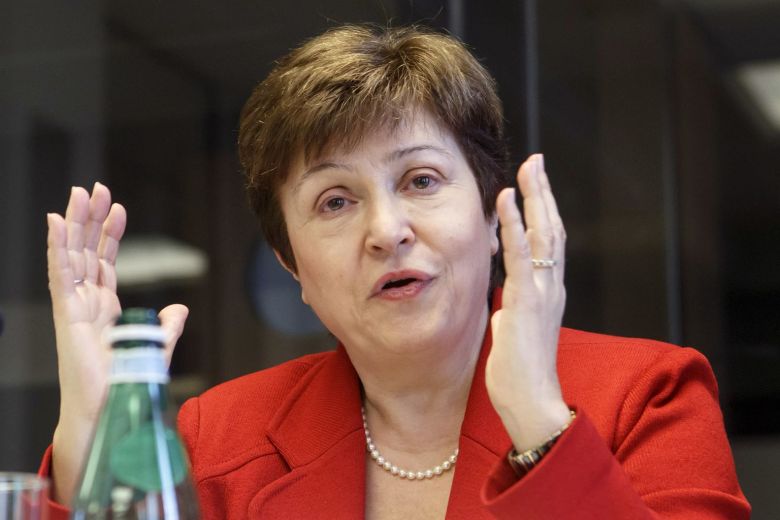31 of 72 world economies to hit recession in 2023, Nigeria safe – IMF
At least 31 of the 72 world economies forming a third of the global community, excluding Nigeria, may hit recession this year due rising inflation and energy crisis, warns the International Monetary Fund (IMF) in its World Economic Outlook. The Managing Director of IMF, Kristalina Georgieva, also repeated this warning at the weekend while speaking […]

IMF Managing Director – Kristalina Georgieva
At least 31 of the 72 world economies forming a third of the global community, excluding Nigeria, may hit recession this year due rising inflation and energy crisis, warns the International Monetary Fund (IMF) in its World Economic Outlook.
The Managing Director of IMF, Kristalina Georgieva, also repeated this warning at the weekend while speaking on the CBS Sunday morning news programme, Face the Nation, in the United States.
Speaking on the 2023 IMF prediction, Georgieva said: “We expect one-third of the world economy to be in recession.
“2023 will be a difficult year for the world. The silver lining is we can use it to transform economies & accelerate change that’s good for our climate, good for growth. At the IMF, we recognize our responsibility to be a force for good,” she noted, adding that a strong U.S. labour market might help the world get through a difficult year.
UK inching close to recession, Bank of England Warns
20 rice farmers feared dead in Kebbi boat mishap
Explaining further, the IMF chief said: “For much of the global economy, 2023 is going to be a tough year as the main engines of global growth – the US, Europe and China – all experience weakening activity.
“The new year is going to be tougher than the year we leave behind. Why? Because the three big economies – the US, EU and China – are all slowing down simultaneously. We expect one-third of the world economy to be in recession. Even countries that are not in recession, it would feel like a recession for hundreds of millions of people,” she added.
Nigeria safe as recession likely in 31 countries
The IMF said a decline in global Gross Domestic Product (GDP) or in global GDP per capita—which often happens when there is a global recession—is not currently in the baseline forecast.
However, a contraction in real GDP lasting for at least two consecutive quarters (which some economists refer to as a “technical recession”) is seen at some point during 2022–23 in about 43 per cent of economies with quarterly data forecasts (31 out of 72 economies), amounting to more than one-third of world GDP,” the global fiscal regulator predicted.
Top of the 31 countries that could fall into recession this year are Germany as its economic growth is expected to plunge from 1.5% in 2022 to -0.3. Italy will crash from 3.2% to -0.2%. It projected that Russia’s economic growth was already in recession at -3.4% in 2022 but will improve to -2.3% in 2023.
In Africa, Nigeria is on the safe side as its economic growth which was at 3.6% in 2021 was estimated to have dropped to 3.2% last year and will further drop by 0.2% to remain at 3.0% in 2023, but still on a positive growth trajectory. This is far ahead of South Africa whose economic growth will drop from 2.1% in 2022 to 1.1% this year.
How Nigeria can avoid recession – Experts
Experts have also spoken about how Nigeria can sustain the projected growth rate without plunging into recession. A professor of Energy Economics and past President, Nigeria Association of Energy Economics, Prof. Omowumi Iledare, who harped on stopping subsidy said Nigerians cannot afford to burn public funds on the tail pipe of cars.
He said, “Subsidy will collapse the Nigerian economy and it is already doing it. When you are spending one trillion naira a year over 10 years to subsidize petrol consumption, not for economic sustainability, then you cannot survive it.
“There is no country in West Africa that is paying less than N200/litre, except Nigeria,” he explained.
Prof. Iledare also linked subsidy to the forex crisis. “That’s one of the reasons the exchange is going higher because there is so much pressure; because of the amount of dollars we spend to import petrol.
“And as a result, inflation is high even though you are paying so high for petroleum products. What it does is to create black market,” he noted.
The current exchange rate between the naira and the United States dollar is N440/$1 on the official market and N735/$1 on the black.
Experts believe that the huge gap between the official forex price and the parallel market is hurting the naira and slowing economic growth.
Speaking to this, a lecturer at UNN Nsukka, Mr David Akwu, said Nigeria’s forex crisis will definitely impact economic performance as businesses wouldn’t be able to grow exponentially.
He said what’s critical for the government is that the economy must be diversified and the oil revenue projections in the 2023 fiscal appropriation must be met for the economy to perform optimally.
By Vincent Nwanma, Simon Echewofun Sunday, Chris Agabi & Abiodun Alade (Lagos)
